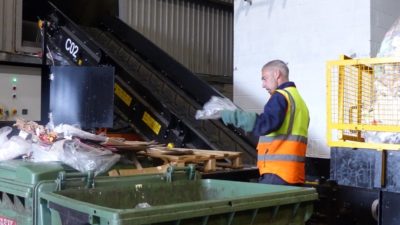
To limit the effect of staffing issues, the Environmental Services Association (ESA) has urged the government to ensure frontline staff maintain access to childcare in the event of a return to widespread school closures, and that they are considered within the priority tranches for vaccination.
During the first lockdown, councils and waste management companies developed a number of risk-mitigation strategies and safe working protocols to limit the transmission of the virus to frontline refuse staff.
This meant the majority of residual collections were able to continue as normal, but a number of other services were halted to utilise crews best and keep vehicles available.
Staff
With rising case numbers now leading to tier 4 restrictions across most of England and with strong restrictions in Wales and Scotland, Jacob Hayler, executive director of the ESA, says the impact on staffing levels is the largest “variable and risk factor” to waste services, and added that the majority of advice from the first lockdown remains in place.

“The recycling and waste sector has, in the main, kept vital services operating effectively from the outset of the coronavirus pandemic, having developed a comprehensive strategy and safe-working protocols to protect frontline staff and limit transmission of the virus,” he said.
Mr Hayler added: “Operators and trade bodies, including the ESA and its members, built these effective structures early on in the pandemic, and this activity was supported through regular interaction with regulators, government and the devolved administrations, which continues to this day.
“Staffing, however, remains the largest variable and risk factor which is why it is essential that frontline staff maintain access to childcare in the event of a return to widespread school closures, and that they are considered within the priority tranches for vaccination – a point the ESA made in a recent letter to government ministers.”
Tiers
On Christmas Eve, two days before the majority of England was placed into the highest tier 4 level, Alok Sharma, secretary of state for the Department for Business, Energy & Industrial Strategy (BEIS), published a letter aimed at those in the manufacturing sector explaining that they would be able to travel into tier 4 areas to work.

The British Metals Recycling Association (BMRA) stated that despite the letter referring to the manufacturing sector, BEIS had been clear with it that the advice “covers all essential sectors, including the metals recycling industry”.
In the letter Alok Sharma states: “I want to be clear that, as before, the manufacturing sector remains essential, and therefore should remain open and operational to continue delivering the vital products and services which we all depend on. I also want to re-iterate that where it is essential to travel between tiers to get to your work or for the purposes of carrying out your work, you are able to do so.”
The BMRA also suggested that workers provide a copy of the letter alongside its advisory to employees who are travelling to work in, and into, a tier 4 area.
Adapted
Despite restrictions rising, Lee Marshall, chief executive of LARAC, said that councils have been operating their services successfully throughout the pandemic, and are well prepared for any disruption.
“Councils moving in to higher tiers will know what to expect and are well prepared with suitable contingency plans in place”
“Councils moving in to higher tiers will know what to expect and are well prepared with suitable contingency plans in place,” he said. “Generally guidance in relation to waste is unlikely to change unless there are high levels of absence due to sickness or self-isolation and services have to be adjusted.”
Preparation
This was echoed by Steve Palfrey, chair of ADEPT’s Waste Group, who added that one of the major impacts has been on waste volumes.
He said: “Talking to colleagues suggests that being in a higher tier hasn’t had a significant additional impact on the delivery of waste services more than in other other tiers. Local authorities worked hard to maintain and restore services during the first national lockdown and that experience has left everyone well-prepared.
“However, there is some evidence that suggests kerbside waste has increased substantially in tier 3 areas, with people working from home or unable to work due to business closure, and this is also true of household recycling, green and food waste. This appears to be largely balanced by a reduction in commercial waste and waste delivered to household waste recycling centres which are less busy in tier 3 areas than others.”











Subscribe for free